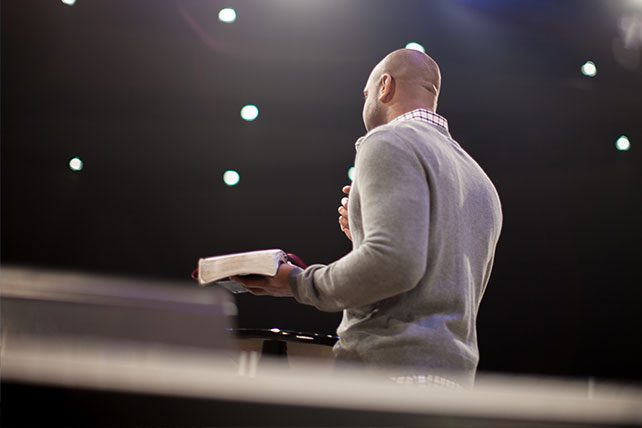Last week Paul Detterman provided five prominent worship challenges facing the church. Turns out he had five more — perhaps more important than the previous c=worship challenges.
5 MORE Worship Challenges We Face All the Time
Loss of Poetic Voice
“Trees don’t clap their hands—that’s just silly!”
In a landmark book on emerging culture, Stanley Greens wrote, “We cannot simply collapse [biblical] truth into the categories of rational certainty that typify modernity. Rather, in understanding and articulating the Christian faith, we must make room for the concept of ‘mystery’—not as an irrational complement to the rational, but as a reminder that the fundamental reality of God transcends human rationality” (A Primer on Postmodernism, Eerdmans, 1996). Ezra Pound once said, “Poetry is news that lasts.” Our world is increasingly devoid of an awareness of anything that cannot be captured by exact language or visual special effects. In worship, we are asking people to use imagery they do not understand to deepen their relationship with the Intangible. Our worship is in trouble, but we who teach the poetry can change this.
We may be starting to see an interesting reversal in this trend in the popularity of the work of Kevin Twit and others who are recapturing the majestic hymn-poems of the past three centuries and recasting them with cutting edge musical interpretation (see RW 66, p. 44). Music may be leading us back to the joy of poetic language!
- How are you teaching people to praise the indescribable?
Loss of Corporate Memory
“What’s the big deal about worship?”
One of the greatest worship challenges we face is remembering why we are Christians and why we are worshiping. In his article “You Have Been Brought Near: Reflections in the Aid of Theological Exegesis” Russell Reno wrote, “Only as we are formed by the common life of the church, her ancient teachings, her ceaseless prayer, and her patterns of self-discipline and mutual service, can we read [Scripture] rightly” (Touchstone, July-Aug. 2002). Our worship is in trouble because we have lost our sense of place in the body of Christ. But we who are the theologians can change this.
How many people in your congregation remember that their gathering is not just a local event, or even some modest portion of a vaguely ecumenical experience? The worship of God’s people, whenever it happens, connects them to the worship of other people in every time and place from before the time Abram built the altar at Shechem.
- How are you helping people join their worship to the worship of The Church?
Loss of Biblical Identity
“What does Abraham have to do with me?”
Christian worship tells a story. Psalms call us to rejoice or lament. Biblical characters come to life through anthems, choruses, and readings. The great teachings of the Bible, cast and presented in appropriate liturgy, can embrace us, encourage us, or convict us, if we see the language, characters, and images as part of our story. We face worship challenges because many people see biblical teachings and stories as simple moralization from another place and time. But we who are preachers and teachers can change this.
- How are you helping people see contemporary relevance in the truth of Scripture?
Loss of Biblical Literacy
“Where the heck is Shechem?”
A study done within the last five years determined that over 75 percent of active members in my denomination had their only contact with Scripture during Lord’s Day worship. Astute preachers know this. Many worship leaders have yet to figure it out. Our worship is in trouble because much of our musical and liturgical language includes biblical images and illusions people do not remember (if they ever knew them at all). Biblical language without citation or explanation can be a foreign language to most modern worshipers. But we who teach the Bible can change this.
- How are you helping people learn and love to “own” Scripture?
Perhaps the #1 Worship challenge: Embarrassment of the Gospel
“Can we still say we are Christians?”
No thinking Christian has avoided struggling with contemporary challenges to the unique claims of Jesus Christ. But Jesus is either who he claims to be or he is not—there is no middle ground. Authentic Christian worship cannot happen apart from the acclamation that Jesus is Lord! Many of the people we lead in worship are not prepared to endorse that exclusive claim. Our worship is in big trouble.
Until pastors, elders, deacons, parents, grandparents, and children are discipled and encouraged to a level of conviction in faith that can only come from a redeemed heart, no amount of liturgical tinkering, musical tweaking, or stylistic transformation will be of ultimate value. The greatest challenge to authentic Christian worship seems to be a crumbling foundation of authentic Christian faith. Happily, we know a Savior whose love can shore up that foundation.
Transformed Worship
Under certain favorable conditions, imitations of authentic worship can flourish for a time through an environment of learned repetition or local tradition, sustained by a “don’t ask, don’t tell” approach to profession of faith and spiritual growth. But corporate worship unsustained by covenantal faith will eventually become dull, shallow, culture-driven, and easily distracted. Sound familiar?
Address these challenges in reverse order, and a path of discipling ministry centered around authentic Christ-centered worship emerges. Individuals mature in their faith. Congregations become transformed communities, glorifying and proclaiming God with vibrant joy. May it soon be so.
This article on worship challenges originally appeared here, and is used by the author’s kind permission.

